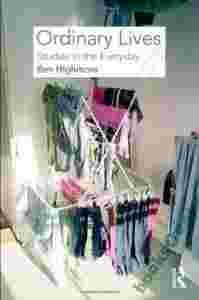|
This new study from Ben Highmore looks at the
seemingly banal world of objects, work, daily media, and
food, and finds there a scintillating array of
passionate experience. Through a series of case studies,
and building on his previous work on the everyday,
Highmore examines our relationship to familiar objects
(a favourite chair), repetitive work (housework,
typing), media (distracted television viewing and radio
listening) and food (specifically the food of
multicultural Britain). A chair allows him to consider
the history of flat-pack furniture as well as the lively
presence of inorganic 'stuff' in our daily lives.
Distracted television watching and radio listening
becomes one of the preconditions for experiencing wonder
through the media. Ordinary Lives links the concrete
study of routine existence to theoretical reflection on
everyday life. The book discusses philosophers such as
Jacques Ranciere, William James and David Hume and
combines them with autobiographical testimonies,
historical research and the analysis of popular culture
to investigate the minutiae of day-to-day life.Highmore
argues that aesthetic experience is embedded in the
mundane sensory world of everyday life. He asks the
reader to reconsider the negative associations of habit
and routine, focusing specifically on the intrinsic
ambiguity of habit (habit, we find out, is both rigid
and adaptive). Rather than ask 'what does everyday life
mean?' this book asks 'what does everyday life feel like
and how do our sensual, emotional and temporal
experiences interconnect and intersect?' Ordinary Lives
is an accessible, animated and engaging book that is
ideally suited to both students and researchers working
in cultural studies, media and communication and
sociology. |
|

